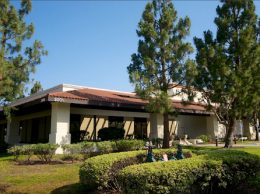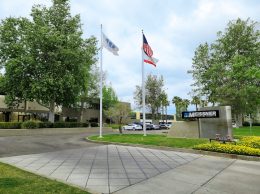Updated at 2 p.m.:
Richard Rush, the only university president CSU Channel Islands students have ever known, announced Thursday that he will retire when the new academic year ends.
He broke the news to the campus community on Aug. 20, at the end of his convocation speech to mark the start of the 2015-16 school year. There were audible gasps in the audience and a standing ovation following Rush’s announcement.
Rush joined CSUCI in 2001, a year before the school welcomed its first students. He was already an experienced administrator and, before that, a professor of English literature at the San Diego and San Marcos CSU campuses.
Rush took over at CSUCI for J. Handel Evans, who was president during the university’s planning phase and the transition of the campus from Camarillo State Hospital to the newest member of the CSU system.
In his 14 years at the helm, Rush has overseen the growth of CSUCI’s enrollment from zero to more than 5,000 students; the hiring of more than 800 faculty and staff members; and the near-doubling of the campus’ land, from 673 to 1,200 acres.
During an interview after his speech with three members of the local media, Rush said he decided to step down for two main reasons: First, he’d accomplished the university’s major founding goals; and second, at age 73, “it was just time.”
“I’ve been blessed with good health, and I still think I’m 18, but I would rather someone who has a longer tenure ahead of them take on the next step,” he said.
The university, Rush said in his convocation speech, is “at a tipping point.” Its accreditation was recently renewed for nine years, and it was also given the authority to fund and develop new campus buildings without relying solely on financial support from the state.
“This gives CI a unique flexibility,” Rush said. “This is an authority and a capacity that other campuses do not enjoy, thus affirming our birthright as a campus of innovation.”
Rush also stressed CSUCI’s identity as a “campus of innovation” after his speech, when he was asked to describe what sets the university apart from the other 22 CSU campuses.
CSUCI, he said, had no choice but to innovate. It was founded with a plan that called for much faster growth than it has achieved. The university had to revise those ambitions early on, first due to budget cuts prompted by the dot-com crash and the brief recession after the Sept. 11, 2001 terrorist attacks, and then during the Great Recession.
“One thing that I didn’t anticipate was that we would be on a starvation diet of resources,” Rush said. “If we had had the resources, we would have grown much faster.”
Rush said he has a few goals for his last year on the job, including getting engineering and marine science programs off the ground and starting the work toward CSUCI’s first intercollegiate sports teams. The campus must also continue its physical development, he said, including planning for more student housing at the south end of campus and more retail space in the University Glen area.
In a statement released just after Rush announced his retirement, the CSU Chancellor’s Office said it will begin a search for Rush’s replacement in coming months. Rush said he expects the CSU Board of Trustees to name a replacement in the spring, so the new president can take over in June or July.
Rush said he will have no say in who replaces him, and he doesn’t expect to play any role at the university next year. In that, he would follow in the footsteps of Evans, his predecessor, who Rush said walked off into the sunset once he retired.
Rush said he hasn’t given much thought to his plans for retirement, apart from seeing more of his wife and their children and grandchildren and looking for volunteering opportunities.
“I hope I’ve led the university in the right way,” he said, when asked to assess his own legacy. “I hope I’ve espoused the university’s values and I hope it will be said that I was here for the students.”
Before joining CSUCI, Rush spent nine years as president of Minnesota State University, Mankato.
He earned a doctorate in English Renaissance literature and a master’s degree in English literature from UCLA.
He and his wife, Jane, reside in Camarillo.






 Print
Print Email
Email

















